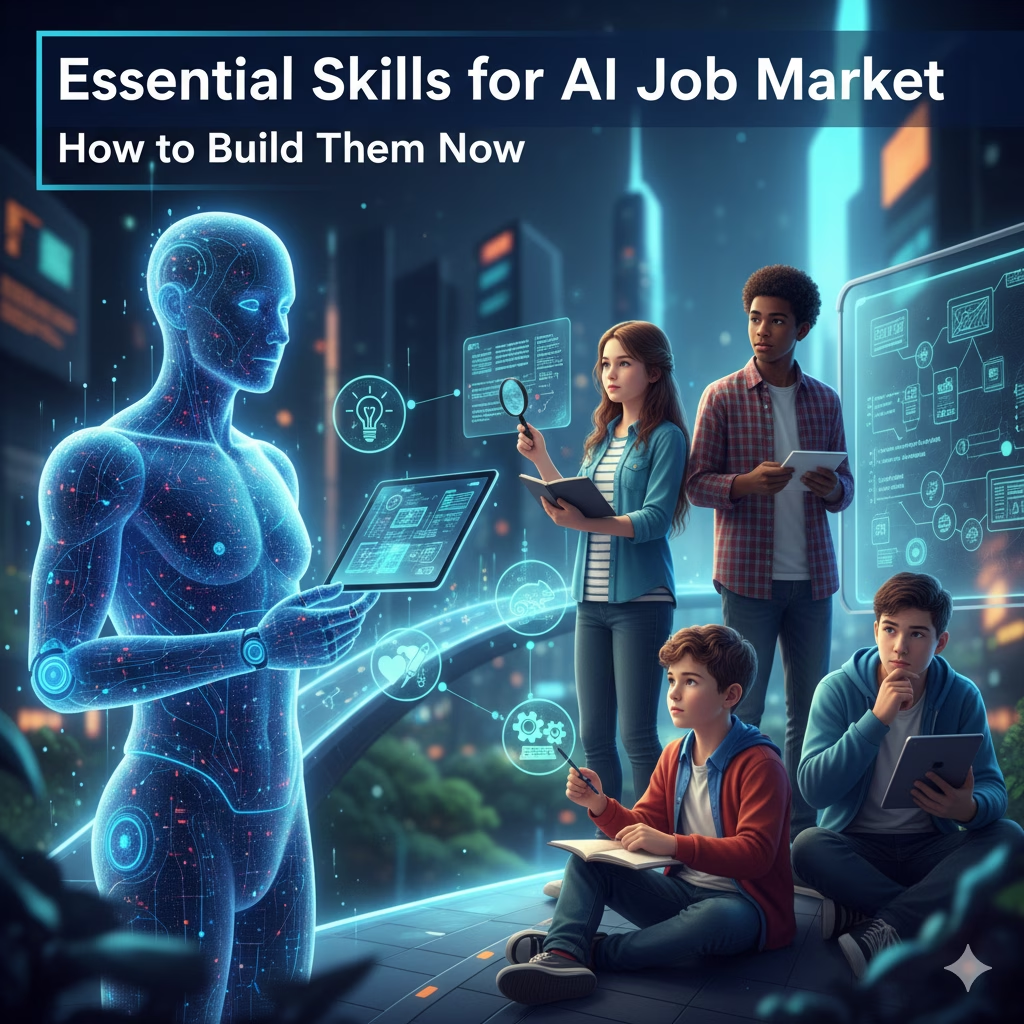
The future of work is here, and it’s powered by artificial intelligence (AI). If you’re a middle or high school student wondering how to prepare for tomorrow’s job market, or a school counselor guiding students toward successful careers, understanding AI skills has never been more important.
Here’s the exciting news: jobs requiring AI skills offer salaries that are 28% higher on average than those without them, representing about $18,000 more per year. Even better? For positions requiring at least two AI skills, the salary premium jumps to 43% higher. And here’s what makes this opportunity truly accessible, you don’t need to wait until college to start building these valuable skills.
The AI revolution isn’t coming, it’s already here. One in four U.S. tech jobs posted this year are seeking employees with artificial intelligence skills, and this trend extends far beyond the tech sector. Since 2022, job postings mentioning generative AI skills increased by 800% for non-tech roles.
What does this mean for students? AI skills are becoming essential across virtually every career path imaginable. from marketing and healthcare to customer service and education. Whether you dream of becoming a doctor, journalist, business owner, or designer, understanding how to work with AI will give you a significant advantage.
Success in the AI job market requires balancing two types of abilities: technical AI skills and uniquely human soft skills. Think of them as two sides of the same coin, both equally valuable.
These are the hands-on abilities that help you understand, use, and create AI tools:
1. Programming Fundamentals Python remains the top specialized skill listed in U.S. AI job postings. Learning to code gives you the foundation to understand how AI works and eventually create your own AI applications.
2. Data Literacy Understanding how to collect, analyze, and interpret data is crucial. AI systems learn from data, so knowing how to work with information effectively is essential.
3. AI Tool Proficiency Familiarity with AI platforms like ChatGPT, coding assistants, and other generative AI tools is increasingly expected. Nearly 50% of K-12 students already use ChatGPT at least weekly, but learning to use these tools effectively and responsibly sets you apart.
4. Machine Learning Basics Understanding concepts like how computers learn from patterns, make predictions, and improve over time gives you insight into AI’s capabilities and limitations.
Here’s something that might surprise you: as AI becomes more powerful at technical tasks, human skills become MORE valuable, not less. AI excels at technical, analytical, and repetitive tasks but lacks creativity, empathy, and human judgment.
1. Critical Thinking AI continues to evolve at a breakneck pace, and its impact on the workplace is profound and far-reaching. The ability to evaluate AI-generated results, identify biases, and make informed decisions is crucial. You need to ask: Is this information accurate? Does it make sense? What’s missing?
2. Creativity and Innovation AI can generate ideas, but it can’t think outside the box like humans can. Your ability to imagine new solutions, combine concepts in unique ways, and approach problems creatively is irreplaceable.
3. Communication Skills In an AI context, explaining the recommendations or functionalities of AI technologies in a clear and accessible way facilitates the adoption of these tools by all employees, including those without technical expertise. Whether you’re explaining technical concepts to non-technical audiences or collaborating on projects, strong communication remains essential.
4. Emotional Intelligence Understanding and managing emotions, both your own and others’, helps you work effectively in teams, provide excellent customer service, and navigate workplace dynamics. Research suggests that only 36% of people can correctly identify their emotions as they experience them, making this a skill that truly sets you apart.
5. Adaptability Technology is projected to be the most disruptive force in the labor market, with AI and information processing technology expected to create 11 million jobs while simultaneously displacing 9 million others. Being flexible, embracing change, and continuously learning new skills helps you thrive in this evolving landscape.
Start with the Basics (and make sure you ask your parents for permission before getting started)
Level Up Your Skills
How to Support Students
You don’t need to become an AI expert overnight. The key is to start learning now, stay curious, and consistently build your skills over time. In an industry as young as AI, most people have no more than a year or two of experience, meaning teens can catch up incredibly quickly with the industry’s primary leaders.
Remember: AI skills are coming to every job function, to every career area, but at different paces. Whether you’re passionate about art, medicine, business, or education, AI literacy will enhance your ability to succeed in your chosen field.
The future belongs to those who can combine technical AI knowledge with uniquely human skills like creativity, empathy, and critical thinking. By starting to build these capabilities now, while you’re still in middle or high school, you’re investing in a skill set that will serve you throughout your entire career.
The AI job market is growing rapidly, the opportunities are diverse, and the potential for impact is enormous. Your generation will shape how AI transforms our world. By developing both the technical and human skills needed to work alongside AI, you’re not just preparing for the future. you’re helping to create it.
This Week:
This Month:
This Semester:
This Year:
Remember: every expert started as a beginner. The best time to start building AI skills is right now. Your future self will thank you!
Related Articles:
Want to learn more about preparing for tech careers? Explore more career guidance articles and resources with Orchard.